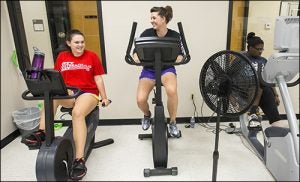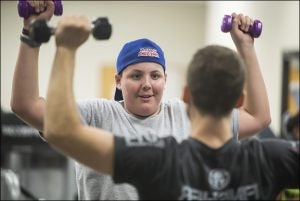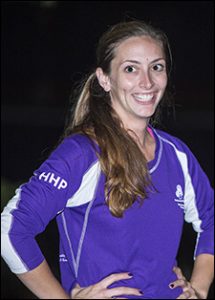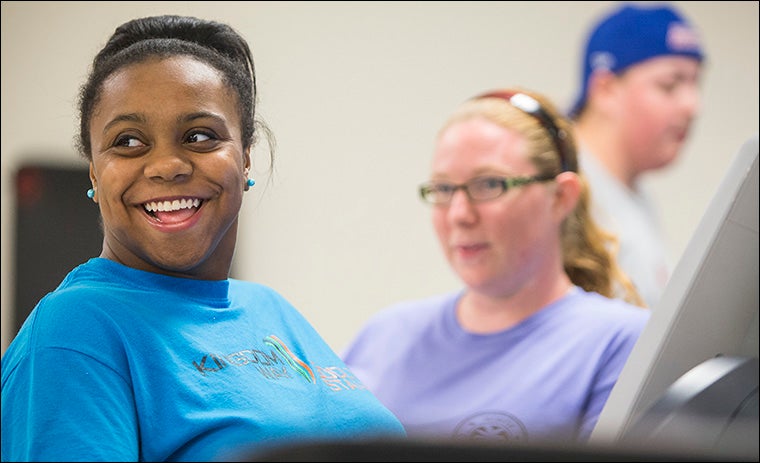MINDSET MENTORS
ECU students learn while training teens to embrace healthy lifestyles
Three days a week, Becky Blanton of Jamesville travels 90 miles round trip to East Carolina University. And she’s not attending classes.
Blanton makes the drive to deliver her adolescent grandchildren – Emily and Caleb Winslow – to ECU’s Project Mentor program, where ECU students help them develop lifelong healthy habits.
While the Winslow teens ramp up their physical fitness, the ECU student mentors gain valuable experience in helping overweight teens develop healthy lifestyles.

Left to right, Ashton Vann, mentor Laura Martin and Jeniya Roberson work out on recumbent bikes in Project Mentor.
Project Mentor is offered by the Department of Kinesiology in the College of Health and Human Performance. Tom Raedeke directs the program with the assistance of Mike McCammon. Both are professors in kinesiology. Participants range in age from 12 to 18 and no fee is charged.
“Our goal is to facilitate exercise success and enjoyment along with providing participants a sense of ownership over lifestyle change,” Raedeke said. “Beyond being just an exercise program, we provide tools that adolescents can use to make lifestyle changes, including eating healthier and being physically active outside the program.
“The benefits go beyond what we expected,” Raedeke said. “We see an increase in self-esteem, self-confidence and a sense of belonging.”
Working relationships
The program’s success rests in part with the relationships formed, McCammon said. “The strength of the bond that develops between the mentor and the mentee has been the most surprising,” he said. “College students learn about the challenges to losing weight. They see that one size does not fit all.”
ECU graduate students Kellie Minton and Pier-Alexandre Desilets serve as program coordinators. Both are studying sport and exercise psychology.

Project Mentor participant Andrew Todd, left, and mentor John Alexander are reflected in a mirror working with weights.
Under Raedeke’s supervision, Minton and Desilets provide two hours of weekly classroom training to undergraduates majoring in exercise physiology and health fitness specialist. Those undergraduates then serve as one-on-one mentors to the enrolled adolescents, working together three days per week for 60 minutes each session.
Minton, a native of Emerald Isle, said her work as a mentor in 2012 helped her gain a sense of community on campus. She had transferred that year from Carteret Community College. “My mentee was homeschooled so we meshed well together,” she said. “We were each other’s own little support system.”
The experience was powerful, Minton said. “It was the first time I had to be professional about exercise.” She said the experience taught her effective communication “using reflective listening skills and asking open-ended questions.” And the bond with her mentee remains strong, two years later.
Sharing benefits
Desilets, a native of Montreal, said the program emphasizes the importance of taking small steps. “Mentors learn lifestyle coaching skills and a small-step approach to improving eating habits and physical activity,” he said. The hands-on program teaches student mentors about “the behavioral side of exercise,” Raedeke said.

Kelli Minton is one of two Project Mentor coordinators.
“They learn how to motivate individuals to make lifestyle changes, which are skills that students can take with them and apply in a variety of careers.
“We’ve had quite a few mentors to comment that this experience has been one of the highlights of their educational experience at ECU,” he said.
Dr. David Collier, associate professor in the Department of Pediatrics and director of the ECU Pediatric Healthy Weight Research and Treatment Center, has referred participants to the program for several years.
“I feel that it is a strong program because it is kid-centered, meaning it matches activities to what the child likes and hence mirrors our patient-centered approach to obesity treatment,” Collier said. “A collateral benefit is exposure to the university among kids who might not otherwise get the opportunity.”
Providing good tools
Raedeke and McCammon have collaborated with Dr. Lesley Lutes, professor in the Department of Psychology, on health coaching.
Lutes said the program addresses two major public health issues – obesity and diabetes. “Learning how to overcome an obesigenic environment requires both physical and mental training,” she said. Accountability to an exercise partner and support while developing a healthier lifestyle are helpful tools, Lutes said.
The partnership helps equip people “with all the tools that we know help people manage their weight long-term,” she said. “That is why our partnership with the Department of Kinesiology is so critical – working together to give children and adults of eastern North Carolina the best that research, and ECU, has to offer.”
Sixteen-year-old Dru Rush of Greenville participated in the program last year. “She loved it,” Cassandra Rush said of her daughter’s involvement. “It is not about losing weight. It is an entire mindset.”
For additional information about the program, contact Raedeke at raedeket@ecu.edu.

Project Mentor participant Faithful-Joy Cotton smiles while working out on a recumbent bicycle. At right is Cotton’s mentor, Shayna Meyers.